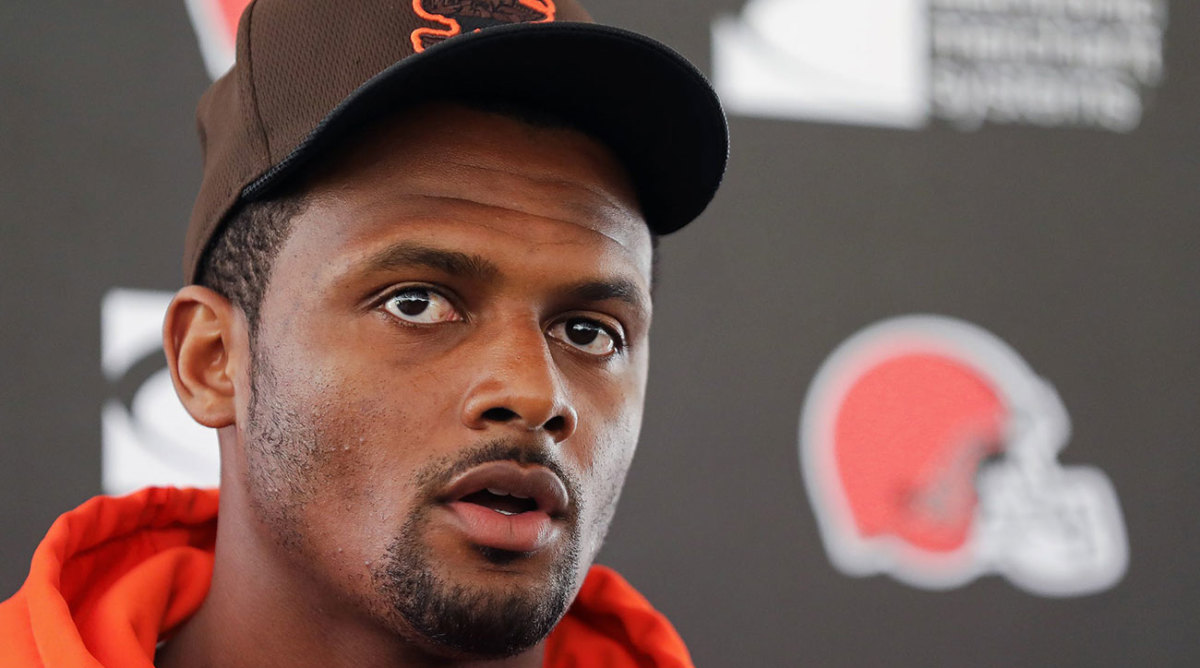Deshaun Watson Settled Without Having to Give a Sufficient Apology
Here’s the only thing that seems right to say at a moment like this, since none of the people in charge are going to say it: I’m sorry.
Sorry to the women who have come forward with accounts of Deshaun Watson’s predatory behavior, dealt with deep emotional scars and gotten branded as opportunists. Sorry to the women who bravely went through the process of having their horror stories validated by former U.S. district judge Sue L. Robinson in her initial ruling on this case, then watched as Watson thumbed his nose at her conclusions.
Sorry to people who have experienced instances of sexual violence or abuse, people who were watching this case and hoping to feel like the world can sympathize, even just a little bit, with what you went through. Sorry that this entire façade, which ended Thursday with Watson having his suspension increased to 11 games, receiving a $5 million fine and agreeing to undergo treatment, feels like nothing but an empty promise undelivered.
Sorry that your experiences were minimized as “being triggered” multiple times, which is a convenient way of making it all seem like it’s not Watson’s fault. Sorry that the people you wanted to hear a real “sorry” from took back all their apologies and are planning to move on with life.

Nowhere in the release containing information on Watson’s suspension does it say explicitly that he has to apologize, or deal with the maddeningly inconsistent messaging that has come out of Browns headquarters or out of Watson’s mouth personally. We’re not talking about the strange interview he did before the Browns’ first preseason game, which he has already contradicted. We’re not talking about the statement released Thursday by the Browns, with Watson’s name on it, that says, in part, “I apologize once again for any pain this situation has caused. I take accountability for the decisions I made.”
We have seen nothing that can counteract our impression of how we know Watson truly feels about the entire thing. Minutes after the decision came down, ESPN reporter Dianna Russini said on air, via ProFootballTalk’s Michael David Smith: “[Deshaun and his agents are] still angry about those six games, so now it’s 11, so to them this is too many games. They still stand by the fact that they’re denying all of this.” Russini added on Twitter that people around Watson maintain, “This isn’t an admission or an apology to the women involved.” It seems clear no one is going to say sorry for that specific undercurrent of defiance, which has lingered throughout.
Minutes after Watson’s statement came out via the team, he told reporters in person, “I’ve always been able to stand on my innocence and always said I never assaulted or disrespected anyone, but at the same point I have to continue to push forward with my life and career.” He added that he only apologized for “people that were triggered.” He said, at some point, that he has his side of the story to tell and that one day he’s going to tell it.
Now might be a good time, in front of people trained to ask legitimate questions. In front of an audience that would get to look him in the eye. In the absence of sorry, something other than the completely disprovable statement that he’s never disrespected a single woman in his life would be preferential. We have all disrespected someone in our lifetime. (Also, let’s not minimize Watson’s actions, as he has tried to several times now, as mere “disrespect.”)
Sometimes we can stomach taking the world as it is, and not how it should be. Seeing Watson’s case come before a disciplinary system unprepared to handle a pattern of behavior this vast, then arriving at a punishment ever so slightly more befitting of a predatory action, even having the commissioner call it—publicly—a predatory action, are instances of incremental progress, even if incremental progress doesn’t feel like progress at all sometimes.
The hard part is watching Watson and the Browns simply shed this situation like a Halloween costume. Watson was initially defiant publicly, nebulously remorseful when he felt the proceedings weren’t going his way and then returned to that defiance the moment it became clear he avoided a real sledgehammer.
Browns owner Jimmy Haslam evoked cancel culture Thursday when he asked, rhetorically: “I think in this country, people deserve second chances. Is he never supposed to play again? Is he no longer supposed to be part of society?”
Of course Watson should be able to play again. Plenty of people—inside the NFL and out—have gotten more than two chances and are appreciative of every single one.
But the precursor to earning a second chance is realizing you’re getting one. If Watson continues to believe and espouse the idea he’s done nothing wrong while providing no contradictory evidence aside from a nonindictment in Texas that was legally complicated from the start, then this isn’t a second chance at all.
Seeing this play out isn’t just “triggering.” Minus some kind of detailed rebuttal, it’s dejecting and insulting. The kind of thing someone should really apologize for.
More Deshaun Watson Coverage:
- Deshaun Watson and the Browns Look Worse Than Ever
- Did Both Sides Get What They Wanted in the Deshaun Watson Settlement?
- Watson Plaintiff: ‘I’m Not a Sex Worker. I Am a Massage Therapist.’
- Houston PD Detective Testified She Believes Watson Committed Crimes, per Report
- What You Haven’t Heard—But Need to Know—About the Deshaun Watson Cases
- After the Browns Signed Deshaun Watson, a Blast Radius of ’Emotions and Anger’
